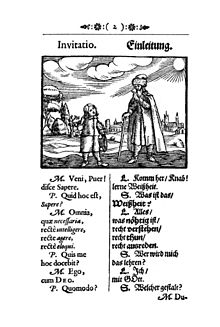student

According to the meaning of the word, a student is originally a person who learns within the organizational framework of a school or who belongs to the following or to the teachers of a teacher. She receives instruction from appropriate teachers in order to acquire, expand, practice and deepen skills , knowledge , insights, values and behavior in a learning process .
State education system
Depending on the type of school and field of education, appropriate types of students can be named. Thus, there are for general education schools the names preschoolers , elementary school students , secondary school students , high school students , special education students , high school students , total student or student (see. Girls' school ). Younger students are called school children. Pennäler is an obsolete term for students of secondary schools .
People who are enrolled in educational institutions in the tertiary (e.g. universities ) or Quaternary (e.g. distance learning schools ) area and receive academic training there are referred to as students .
Most of the time, students are part of a group with similar learning goals. In the context of public school education, this is usually the school class up to lower secondary level in Germany , Austria and Switzerland . However, special life situations also require special arrangements. In the case of circus children, children of inland waterway operators and showmen , lessons are generally held in constantly changing schools, which depend on the parents' whereabouts. This is also referred to as travel students. Circus children often have a regular school as the circus moves into winter quarters between October and April. Travel students must always prove with an examination shortly before the interim certificates whether they have an educational level appropriate to their age.
Home schooling , including home schooling, in which the children are taught at home, is not permitted in Germany because schooling is compulsory .
A special form of teaching takes place in the extremely sparsely populated parts of Australia and Canada . Since the children there cannot be expected to travel long distances to a school, the daily lessons take place via radio devices (mostly CB radio ). Just like in normal schools, a lesson plan regulates the process. Homework is sent by post to the teacher for correction or, since the IT system has moved in, done by e-mail and the Internet. Since the PC and Internet have become the norm in households, lessons have also been given via webcam and microphone. Every month, the performance of students with a Testday checked (test day), the "Radio Child" make the in a school.
Other forms
Commercial schools, such as music schools , sports schools, dance schools , driving schools , have students, as well as private and private tutors .
People educated in a certain scientific, literary or artistic direction are also referred to as students of the same (e.g. Bauhaus students ). Scientists, artists or musicians are often referred to as “pupils” of a famous teacher in their subject, the pupils of pupils as grandchildren .
Students are also referred to as people who personally take lessons from a person who has a particularly good command of a skill or a subject, from a master , e.g. B. with a spiritual teacher or guru . In traditional handicrafts , science and art , one often speaks of the student of a master (= the master student ) and thus makes direct reference to the influences and sources of student knowledge (see school (artist) , school (science) ).
The trainees in a craft business also learn from masters, but are more likely to be referred to as apprentices . In countries with dual vocational training , they are also vocational students . In the jargon of artistic professions, learners at the corresponding technical schools for drama and dance are referred to as Eleven , as well as at the Spanish Riding School . Budding farmers and foresters during their practical training are also called this.
The novitiate is the formation that people who have entered a religious community receive in preparation for the religious vows . In a figurative sense, someone is also referred to as a novice who has newly acquired a certain subject area and is not yet able to work there independently, see also newcomer .
Historical
Up until the 1960s, pupils in the first grade of elementary school learned to write with a handy, small, wood-framed slate , from which the term Taferlklass (l) der comes. Up to the present day school beginners are represented in drawings with a dark gray table sticking out of the school bag carried on the back and with a (damp) cloth dangling from this on a string (see picture) or sponge and possibly also a stylus.
The following writing utensils, paper and pencil, and then a pen - on smooth paper - are still common today. The graphite pen has been lead-free since the 1960s , the goose nib has been replaced by a pen and metal nib, and the inkwell has been replaced by cartridges . Keyboards experienced the development from mechanical (also: electromechanical for short) to acting on a computer screen and integrated into the touch screen .
Web links
Individual evidence
- ^ Friedrich Kluge , Alfred Götze : Etymological dictionary of the German language . 20th ed., Ed. by Walther Mitzka , De Gruyter, Berlin / New York 1967; Reprint (“21st unchanged edition”) ibid 1975, ISBN 3-11-005709-3 , p. 682 f. (Latin schola : crowd, troop, war band; place of instruction, followers of a teacher, totality of the clerks).

